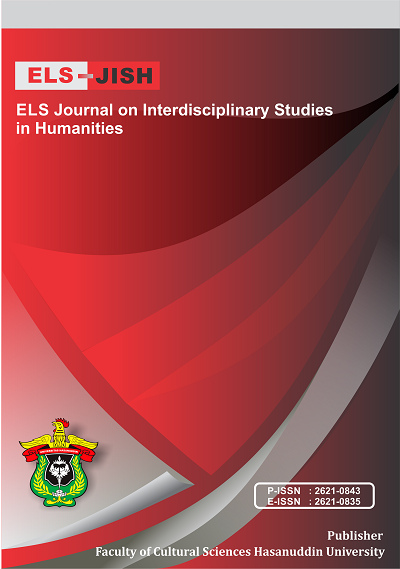Positive Politeness Strategies Used by Parents in Peppa Pig Official YouTube Channel
DOI:
https://doi.org/10.34050/elsjish.v5i4.24140Keywords:
Parents’ Speech, Positive Politeness Strategy, Peppa Pig Youtube ChannelAbstract
Parents are the first ones responsible for their children’s speech. Bad and good children’s speech behavior in society would be considered the results of their parents’ teachings. This research was conducted to analyze this phenomenon by exploring the positive politeness used by parents while communicating in front of their children. It showed how parents construct their speech to exemplify good speech behavior to their children. This research used qualitative research, specified to content analysis method to analyze the data. The data were collected from the video entitled “Peppa Pig Official Channel, Peppa Pig Adds Pineapple in Her Pizza” from Peppa Pig Official YouTube Channel. The results showed that the most strategy used was the ‘include both speakers and hearers in the activity’ which appeared in 36 out of 319 utterances. It showed Daddy Pig’s and Mommy Pig’s efforts to promote the politeness of appreciating others’ existence through their speech to their children. Furthermore, all the positive politeness strategies were used by Daddy Pig and Mommy Pig as the parents in Peppa Pig Video. Therefore, this video was recommended for parents to see how they can construct their language politely while speaking with their children. It will help children to get used to speaking politely and appropriately.
References
Asjuh, N. (2019). Politeness strategies in children communication at Indonesian religious kindergarten. In Proceedings of the 65th TEFLIN International Conference, 65(01), 55-62.
Ativie, K. (2020). Politeness in service encounters: A study of Nigerian Pidgin. Awka Journal of English Language and Literary Studies, 7(1), 195-207.
Borris, D. & Zecho, C. (2018). The linguistic politeness having seen on the current study issue. Linguistics and Culture Review, 2(1), 32-44. https://doi.org/10.37028/lingcure.v2n1.10
Brown, P. & Levinson, S. C. (1987). Politeness: Some universals in language usage (Vol. 4). Cambridge university press.
Gao, B., Zhou, W., & Liu, W. (2021). Politeness, language and culture. Advances in Social Science, Education and Humanities Research, 537, 212-215.
Hamrakulova, G. (2020). Politeness theory in language. Mental Enlightenment Scientific-Methodological Journal, 2020(2), 151-157.
Kádár, D. Z., & Haugh, M. (2013). Understanding politeness. Cambridge University Press.
Kamlasi, I. (2017). The positive politeness in conversations performed by the students of English study program of Timor University. Journal of English language, literature, and teaching, 1(2), 68-81.
Liddicoat, A. J., & McConachy, T. (2019). Meta-pragmatic awareness and agency in language learners’ constructions of politeness. Pragmatic and Cross-cultural Competencies.
Mahmud, M. (2019). The use of politeness strategies in the classroom context by English university students. Indonesian Journal of Applied Linguistics, 8(3), 597-606.
Megaiab, M., Wijana, I., & Munandar, A. (2019). Politeness strategies of request used between Libyan students and their lecturers using English as a foreign language. Online Submission, 2(4), 203-212.
Mojo, J. K., Tulung, G. J., Kalangi, L. M., & Imbang, D. (2021). Positive politeness strategies of Tonado Javaness (Jaton) community. Linguistics and Culture Review, 5(S1), 1100-1109.
Nassaji, H. (2020). Good qualitative research. Language Teaching Research, 24(4), 427-431. https://doi.org/10.1177/1362168820941288
Nurmawati, Haryanto & Weda, S. (2019). An analysis of positive politeness strategies to promote effective interaction in the classroom. ELS Journal on Interdisciplinary Studies on Humanities, 2(2), 171-181.
Pradnyani, N. L. P. B., Budiarsa, M., & Sudana, I. (2017). Positive politeness strategies in animation movie “Home” directed by Tim Johnson. Jurnal Humanis, 19(1), 198-205.
Prayitno, et al. (2018). Power, orientation, and strategy of positive politeness used by children at the age of elementary school with Javanese cultural background. Jurnal Humanis, 17(2), 164-173.
Umaroh, L., & Kurniawati, N. (2019). How does politeness emerge in preoperational stage. ETERNAL (English Teaching Journal), 10(1), 24-29.
Umaroh, L., Kurniawati, N., & Sari, C. A. (2017l). An investigation of young children's politeness principle. In English Language and Literature International Conference (ELLiC) Proceedings, 1, 315-319.
Rahayuningsih, D., Saleh, M., & Fitriati, S. W. (2020). The realization of politeness strategies in EFL teacher-students classroom interaction. English Education Journal, 10(1), 85-93.
Rija, M. (2016). Positive politeness strategies in the novel "The Client": A sociopragmatic study. Metalingua, 14(2), 209-224.
Roller, M. R. (2019, September). A quality approach to qualitative content analysis: Similarities and differences compared to other qualitative methods. Forum Qualitative Sozialforschung/Forum: Qualitative Social Research, 20(3).
Sartika, D. & Ambalegin. (2020). The positive politeness analysis used in Virgin-Meet the author. Journal of Language and Literature, 7(1), 53-64.
Wati, N. L. H. R. & Puspani, I. A. M. Positive politeness strategies used by the character in the movie The Patriot. Humanis: Journal of Arts and Humanities, 24(1), 1-10. DOI: https://doi.org/10.24843/JH.2020.v24.i01.p01
Yeomans, M., Kantor, A., & Tingley, D. (2018). The politeness package: Detecting politeness in natural language. R Journal, 10(2), 489-502.
Yuniarti, E., Natsir, M., & Setyowati, R. (2020). Positive politeness strategies on Catwoman movie. Jurnal Bahasa, Sastra, Seni, dan Budaya, 4(2), 264-276.
Zastika, Y. (2021). Learning and pragmatic values: Students' positive politeness strategies in English learning. In UICELL Conference Proceeding, 134-147.
Downloads
Published
Issue
Section
License
Copyright (c) 2022 Natasha Ayalus Yoan Yola Yolanda, Barli Bram

This work is licensed under a Creative Commons Attribution-NonCommercial-ShareAlike 4.0 International License.






